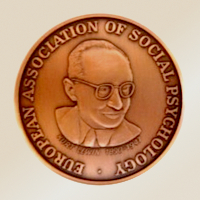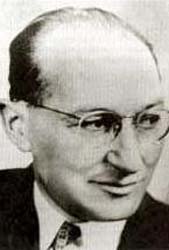Kurt Lewin Medal
Information about previous awards
Three Kurt Lewin Medals will be awarded at each General Meeting. This is a mid-career award that recognizes full members who have made an outstanding scientific contribution. Candidates for this award can be self-nominated, or nominated by colleagues. The awardee is selected by the EC in the Autumn preceding the General Meeting, based on the recommendation of a committee of three EASP members, chaired by the EASP President. The awardees receive a certificate and a bronze medal. EASP additionally covers the registration fees of the awardees for the General Meeting.
Eligibility and Past Award Winners
The Kurt Lewin awards are meant to acknowledge outstanding scientific contributions made by a full member of the Association who has passed beyond the age/time criteria of the Jos Jaspars awards. These Medals can be seen as similar to mid-career contribution awards in other learned societies although no age-limit is placed on the recipients: it is their contribution to the field through a particular research program or area of research that is being recognized.
Nominations for Lewin Medal must be supported by two full members of the Association, and nominees will typically have completed their PhD more than 10 and less than 25 years previously. No member can support more than one nomination. The medal will be awarded to a full member of the Association who has made a substantial contribution to European social psychology through excellence in individual scholarship and through support for the scholarship of others.
Both nominators should state in writing that they have permission of the candidates as their official nominators (i.e. to ensure that no more than two "official" nominations are considered per candidate by the panel). These nomination letters along with the curriculum vitae of the candidate should be sent to the executive officer, Sibylle Classen, before October 1st of the year that precedes the next General meeting.Recipients of the Kurt Lewin Medal will be selected by a four-person panel comprising one member of the Executive Committee and three external members.
Past award winners
- 2017: Fabrizio Butera, Pablo Brinol, Colin Leach
- 2014: Carsten de Dreu, Jolanda Jetten, Paul van Lange
- 2011: Jens Förster, Constantine Sedikides, Russell Spears
- 2008; Naomi Ellemers, Neil Macrae, Vincent Yzerbyt
- 2005: Alex Haslam, Ap Dijksterhuis, Miles Hewstone
Biography of Kurt Lewin (1890-1947)
by Millie V. Jones
Kurt Lewin is considered to be by many, the most charismatic psychologist of his generation. He was born in Germany in 1890. His formal training in psychology began in 1910 in Berlin and led to a Ph.D. in the experimental study of associative learning.
During World War I Lewin served as a private and eventually became a lieutenant in the German army. He was wounded in action and received an Iron Cross. After the war he returned to the Psychological Institute in Berlin where he became Privatedozent in 1921. In 1927, at the age of 37, he advanced to Ausserordentlicher Professor.
Lewin came to the United States in 1932 as a visiting professor to Stanford University. His influence in America was immediate. Lewin published many books before his arrival to the United States and after. With Fritz Heider, a fellow refugee friend from Berlin, and his American wife Grace, he wrote Lewin's Principles of Topical Psychology. Lewin left Stanford for Cornell and eventually settled down at the University of Iowa from 1935 to 1944. After Lewin moved from Iowa he established and directed the Research Center for Group Dynamics at the Massachusetts Institute of Technology.
Lewin is most renowned for his development of the field theory. The field theory is the "proposition that human behavior is the function of both the person and the environment: expressed in symbolic terms, B = f (P, E)."(Deaux 9) This means that one's behavior is related both to one's personal characteristics and to the social situation in which one finds oneself.
The field theory may seem obvious to us now, but most early psychologists did not believe in behaviorism. Many psychologists at the time believed in the psychoanalytic theory that held human motives to be blind pushes from within. Lewin thought of motives as goal-directed forces. He believed "that our behavior is purposeful; we live in a psychological reality or life space that includes not only those parts of our physical and social environment that are important to us but also imagined states that do not currently exist".
Lewin's field theory led to the development of actual field research on human behavior. With boldness, Lewin manipulated complex situational variables in natural settings. His approach has guided experiments in the field of social cognition, social motivation, and group processes. Most importantly Lewin helped develop action research. Action research uses empirical social research, social action, and controlled evaluation.
Clearly, Kurt Lewin's field theory and action field research has one of the most outstanding impacts on modern social psychology. His field theory explained that our actions are a result of both environmental and psychological traits. We are not just beings who act from internal impulses. Instead we are greatly influenced by our surroundings.
Lastly Lewin's belief that social-psychological phenomena can be studied experimentally was a huge impetus for scientific research. He was the first to test human behavior in a controlled setting. His research also showed events must be studied in relation to one another, and that both the individual and the group are important. His research helped to better explain leadership atmospheres and group dynamics.
Kurt Lewin's influence on scientific research is his legacy. He was a ground-breaking psychologist who greatly impacted his field. Kurt Lewin will continue to influence both theory and research all the way to and beyond the twenty-first century.

